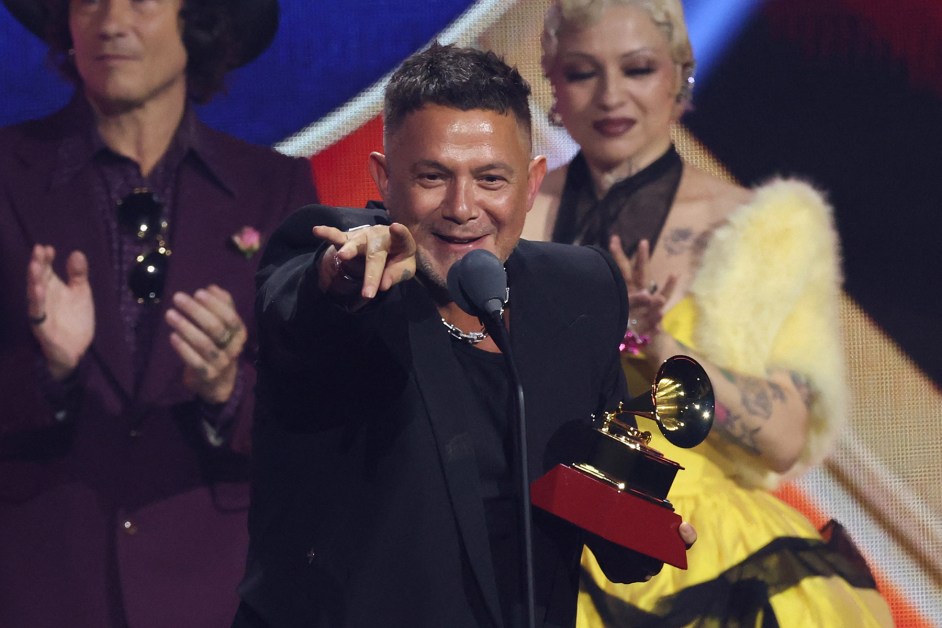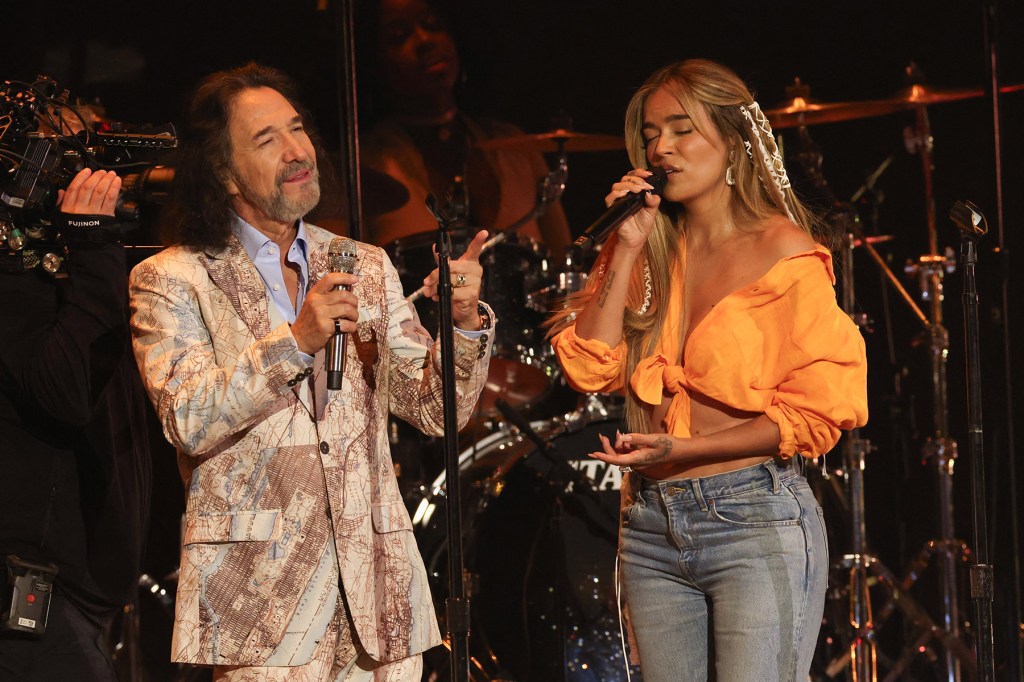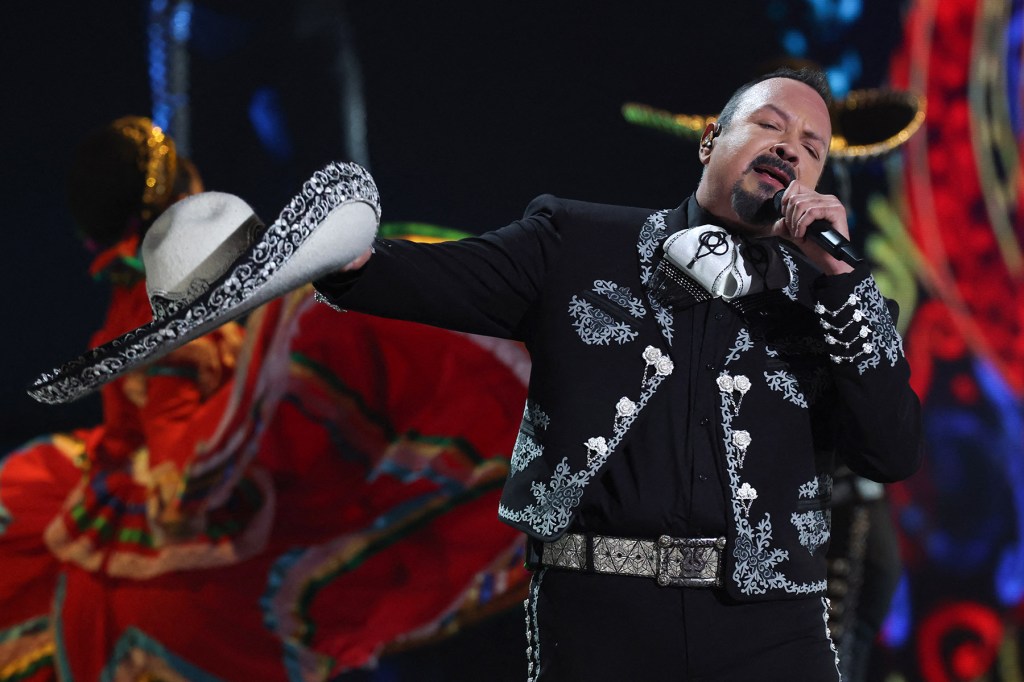Latin
Page: 4
Trending on Billboard
New Music Latin is a compilation of the best new Latin songs and albums recommended by Billboard and Billboard Español editors. Check out this week’s picks below.
Explore
See latest videos, charts and news
Laura Pausini & Yami Safdie, “Eso y Más” (Warner Music Italy)
Italian superstar Laura Pausini reimagines Joan Sebastian’s ballad “Eso y Más,” and recruits rising Argentine artist Yami Safdie for her version. Pausini and Safdie inject pathos in their delivery to match Sebastian’s emotionally-charged rendition of this classic, which was featured on his album Más Allá del Sol and peaked at No. 6 on Hot Latin Songs in 2007. Pausini and Safdie’s vocals soar as they sing this Mexican music anthem that captures unconditional love and a deep sense of devotion for a significant other. Pausini expressed admiration for Sebastian at this year’s Billboard Latin Music Week, and said this version of “Eso y Más” will be part of her upcoming album, Yo Canto 2. — GRISELDA FLORES
DannyLux, Leyenda Deluxe (VPS Music / Warner Music Latina)
While DannyLux stays true to his signature sadboy-loverboy sierreño style, Leyenda Deluxe dares to venture into exciting new terrain. The four new tracks build on the fantastical energy of Leyenda (released in May) that blends poetic lyricism with inventive arrangements. “Yo Mismo Soy Culpable” pairs steely acoustic guitars with a flicker of an electric one. “preguntalealaluna” brims with melancholic allure, unfolding as a vulnerable conversation with the moon, while the breezy “¿Qué Sucedió?” reflects the artist’s realization that love isn’t always enough to make someone stay. But it’s the magnetic focus track “Quizás” that steals the spotlight, channeling ’90s alt-pop elements as the SoCal artist trades heartbreak for flirtation. By stitching these new sonic textures into the richly emotional sierreño soundscape, the star further solidifies his place as a boundary-pushing storyteller. — ISABELA RAYGOZA
La Arrolladora Banda El Limón de René Camacho & Juanes, “Una Noche Contigo” (Fono)
This is a collaboration that we never imagined could happen, and that makes it even more powerful. The soft sounds of the trumpets from the opening bars anticipate a love song in the style of one of the greatest bands in the Sinaloa genre. The voice of Julio Haro from La Arrolladora Banda El Limón de René Camacho blends perfectly with that of Juanes, who, without abandoning his style, adds the intensity that characterizes a regional Mexican performance. While an unorthodox collaboration, the purpose is clear: to convey a romantic story, albeit from a different perspective. Music has no borders, and this is an example of that. You can have the best of both worlds without forcing anything. — TERE AGUILERA
HUMBE, “Morfina” (PARASIEMPRE.wav Records)
If you discovered HUMBE thanks to “Fantasmas,” a beautiful mariachi song that went viral on social media, you will truly appreciate the Mexican star’s new track, titled “Morfina.” While the former embraces a more roots style that gives it that ranchera sensibility, this new one thrives on a more subtle nu-pop sound but equally effective in lyricism inspired by spirituality, healing and eternity. “Morfina,” that ends with a gorgeous classical arrangement, previews HUMBE’S upcoming new project, due in weeks. — G.F.
Check out more Latin recommendations this week below:
Alejandro Sanz stuns, Bad Bunny falls short, and CA7RIEL & Paco Amoroso dominate.
11/14/2025
Trending on Billboard Latin Grammys week kicked off with a wave of industry events that led to the 2025 Latin Grammy Awards on Thursday night (Nov. 13). Prior to the awards ceremony—where Bad Bunny, Ca7riel y Paco Amoroso, and Edgar Barrera led the nominations—Billboard took over the bustling Las Vegas to take readers inside the […]
Read on to find out who made the top of our list.
11/13/2025
Trending on Billboard On the heels of winning best urban song for his heartfelt “DtMF,” Bad Bunny took center stage to perform with Chuwi at the 2025 Latin Grammys on Thursday night (Nov. 13). Their performance kicked off with the emerging Puerto Rican band singing their suave salsa single “Tikiri,” released in 2022. Soon after, […]

Trending on Billboard Nearly naked muscled bodybuilders, towering mountains modeled after a hat, sewing machines and unapologetic Versace flamboyance — this was the vibe at one of the most jaw-dropping performances of the 2025 Latin Grammys on Thursday night (Nov. 13). CA7RIEL y Paco Amoroso turned the stage into a spectacle of pure originality, embracing […]
Trending on Billboard
Raphael was all smiles upon receiving — this time on camera — his 2025 Person of the Year award from the Latin Recording Academy on Thursday night (Nov. 13) during the Latin Grammy Awards ceremony.
After being honored at a star-studded gala the previous eve, the legendary 82-year-old artist took to the stage for a memorable performance, accompanied by more than a dozen musicians who delivered a big band sound. The iconic Spanish singer-songwriter performed classics including “Qué Sabe Nadie” and “Mi Gran Noche” with his characteristic power and interpretive sensitivity.
Raphael, who last year was diagnosed with primary brain lymphoma, looked cheerful and classy in a dark two-piece suit and tie as he accepted his award from Gloria Estefan and Marco Antonio Solís.
“There are artists who have defined decades, and then there’s you, Raphael,” said Estefan, who called the honoree her “personal idol.” Solís added: “With that talent you’ve crossed generations and borders, but that style is something you’re born with.”
Clearly pleased, Raphael accepted the award from his colleagues to a standing ovation from the audience at the MGM Grand Garden Arena in Las Vegas.
“Here it is!” he exclaimed, showing off his trophy. “On this new trip, I’m happy to meet so many friends, both from Spain and from here. Delighted to be here. I solemnly promise I’ll be back.”
“They gave me this last night, and it’s wonderful that I get to hold it today,” he added with a smile. “Thank you so much.”
Considered one of the pioneers in the internationalization of Latin music, Raphael, whose real name is Rafael Martos, was born in Linares in 1943 and raised in Madrid. His talent was evident from an early age, being awarded Best Child Voice in Europe at the age of 9 at the Salzburg Festival. He gained international recognition by representing Spain in Eurovision with songs such as “Toco Madera” (1988), “Maravilloso, Corazón, Maravilloso” (1989) and “Escándalo” (1992), which reached No. 2, 7 and 9 on Billboard‘s Hot Latin Songs chart, respectively. In 2022, he was recognized with the Billboard Lifetime Achievement Award.
The Latin Recording Academy’s Person of the Year award honors musicians for their artistic achievements in the Latin music industry as well as their humanitarian efforts. Raphael joins a list of previous honorees that includes Carlos Vives (2024), Laura Pausini (2023), Marco Antonio Solís (2022), Rubén Blades (2021), Juanes (2019), Maná (2018), Alejandro Sanz (2017), Marc Anthony (2016), Roberto Carlos (2015), Joan Manuel Serrat (2014), Miguel Bosé (2013), Caetano Veloso (2012), Shakira (2011), Plácido Domingo (2010), Juan Gabriel (2009), Gloria Estefan (2008), Juan Luis Guerra (2007), Ricky Martin (2006), José José (2005), Carlos Santana (2004), Gilberto Gil (2003), Vicente Fernández (2002), Julio Iglesias (2001), and Emilio Estefan (2000).
In its 26th edition, the Latin Grammys ceremony is hosted by Maluma and Roselyn Sánchez and broadcast live on Univision. For a full list of winners, click here.
Trending on Billboard DannyLux, Kakalo and Iván Cornejo, three young voices in Mexican music, delivered one of the most heartfelt performances on Thursday (Nov. 13) during the 2025 Latin Grammy Awards ceremony. On a stage decorated solely with blue and white lights, showcasing the most contemporary sounds of the genre, the three artists — who […]
Trending on Billboard
Karol G and Marco Antonio Solís joined forces on Thursday night (Nov. 13) at the 2025 Latin Grammy Awards to deliver a heartfelt performance of “Coleccionando Heridas.” The Mexican legend and Colombian superstar brought two generations and styles together in a showcase that felt understated yet charming.
Midway through the song, the duo danced, adding a touch of warmth and camaraderie to the stage. Karol kept her look casual yet alluring, styled with jeans, a peach-pink top, and sporting braids adorned with decorative laces, embodying a relaxed persona. Meanwhile, Solís, with a flamboyant flair, contrasted Karol’s simplicity with a bold yellow suit. His silky vocals, paired with Karol’s unique tone, elevated the gentle melody, as they sang the main hook: “Yo seguiré coleccionando heridas.” The duet stood out as a memorable, sweet moment in the broadcast backed by a live ensemble.
The 26th annual Latin Grammy Awards can be seen on Univision, UNIMÁS and ViX. The ceremony features performances from Carlos Santana, Christian Nodal, DannyLux, Rauw Alejandro, Aitana, Fuerza Regida and more.
Bad Bunny leads the nominations this year, topping the list with 12 nods, including album of the year for Debí Tirar Más Fotos and double mentions in the record of the year and song of the year categories for “Baile Inolvidable” and “DTMF.” Hot on his heels are Mexican-American producer-songwriter Edgar Barrera and Argentine duo CA7RIEL & Paco Amoroso, each earning 10 nominations.
This year’s ceremony boasts 60 categories honoring the very best in Latin music. Fans can follow along with all the night’s winners as the list updates live — click here to see who takes home a trophy.
Check out more Latin Grammy coverage, including performance highlights, special award moments, and exclusive behind-the-scenes action on Billboard.com.
Trending on Billboard Pepe Aguilar, a Mexican artist who can traverse many genres – from traditional ranchera to progressive pop — went for tradition in his 2025 Latin Grammys performance. Singing with the backing of a 16-piece mariachi, Aguilar belted “El Cihualteco” and “El Fuereño,” from his album Mi Suerte Es Ser Mexicano, nominated for […]

 State Champ Radio
State Champ Radio 









